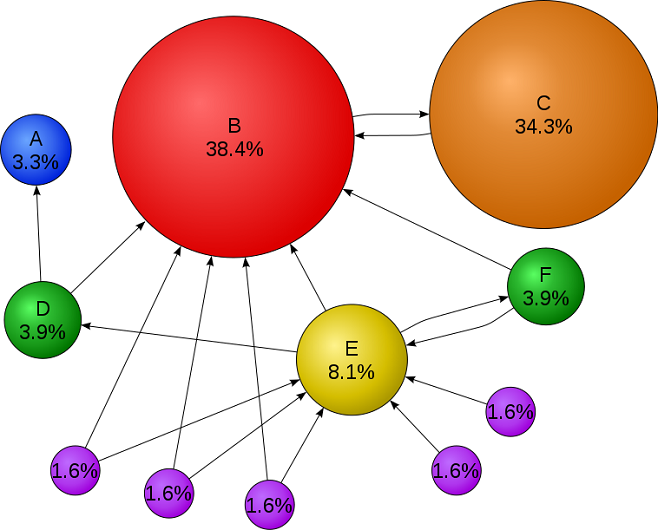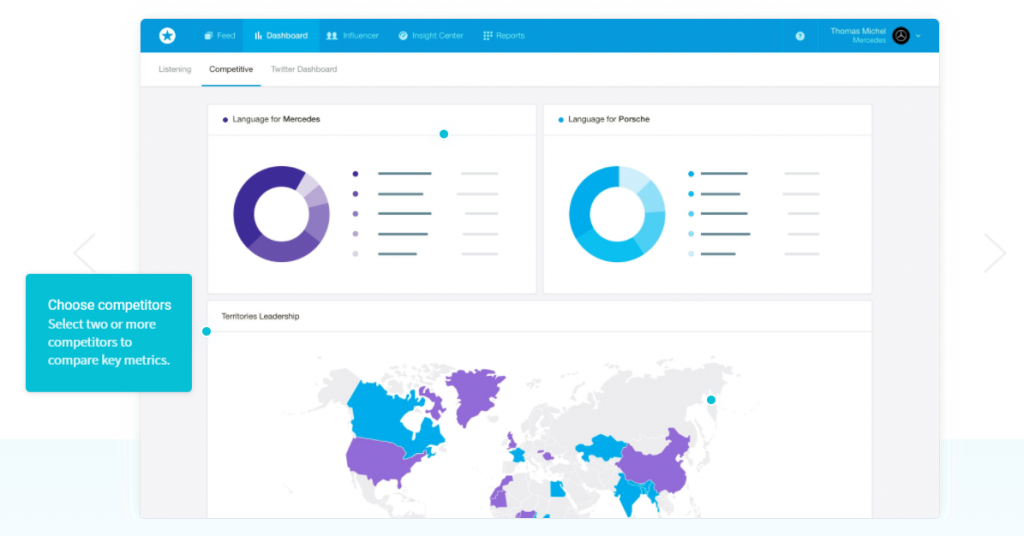Since the early days of search, Google has used links as a means of judging the reputation and relevance of webpages. The more links pointing to a particular page, particularly from other reputable pages, the more importance Google would award it in search.
And so link building developed as an SEO strategy, with SEOs doing everything they could to win, buy or otherwise gain links pointing to their website in order to boost it up the rankings.
Over the years, Google has made a lot of adjustments to the way it treats links, cracking down on paid-for or freebie links and implementing algorithm updates like Penguin or Fred which penalize sites with a lot of spammy links. This has made link building a lot trickier for SEOs than it once was.
At the same time, the web has evolved, and search engines have evolved along with it. With the rise of social media, digital assistants and voice interfaces, and the increasing merging of the online and offline worlds, the number of links pointing to a site seems like a slightly outdated way of judging its reputation – not to mention easy to game.
And in fact, it’s not the only means that search engines have of judging reputation. Over the past few years, major search engines like Google and Bing have developed the ability to gauge a website’s reputation via any reference to a brand, anywhere online, together with the sentiment it is mentioned in. These references are known as “linkless mentions”, or “linkless backlinks”.
We touched on the rise of linkless mentions in our recent piece ‘How to future-proof your SEO for 2018’. In this article, we’ll look more closely at how linkless mentions have changed the nature of link building, and how you should adjust your strategy to account for them.
How do linkless mentions work?
Previously, Google used an algorithm known as PageRank to assess a page’s authority. In essence, PageRank considered links pointing to a page to be like “votes” for that page; the more votes a page received, particularly from other pages with a lot of votes, the more importance it was given.
Of course, this has never been the sole factor that Google uses for determining ranking, and plenty of commentators warned against the dangers of thinking that a high PageRank instantly correlates to a high search ranking. But it was given a lot of emphasis in SEO nevertheless.

An illustration of how PageRank works for a simple network, with percentages to represent page authority.
Times have moved on since then, and in early 2016 Google officially retired PageRank from its toolbar in order to avoid misleading website owners about just how important PageRank was. While Google still uses PageRank internally, it’s clear that there is a lot more to how it judges a website’s authority.
Meanwhile, evidence has been mounting that both Google and Bing are able to associate mentions of a brand or website without a link, and use that as a trust signal.
At SMX West 2016, Duane Forrester, Bing’s former Senior Product Manager, stated that linkless mentions can be just as strong a signal as regular links, adding that Bing figured out how to associate mentions without a link, as well as determine sentiment and tone, “years ago”.
As for Google, sharp-eyed industry commentators noticed a patent that Google filed in 2014 which defined non-linked mentions as “implied links”. Simon Penson, writing for Moz, explained exactly how this works in practice:
“It means that once a connection is made by someone typing in a brand name or other search query and then clicking on a site it creates a connection in Google’s eyes. The search engine can then store that info and use it in the context of unlinked mentions around the web in order to help weight rankings of particular sites.”
But the shift towards unlinked mentions as a trust signal was most clearly spelled out by Google’s Gary Illyes, in a keynote at Brighton SEO in September 2017. Talking about SEO best practices that webmasters should stick to, Illyes said:
“Basically, if you publish high quality content that is highly cited on the internet – and I’m not talking about just links, but also mentions on social networks and people talking about your branding, crap like that. Then you are doing great.”
It couldn’t be spelled out more plainly: Google considers all mentions of your brand on the internet, not just links, to be akin to a trust signal, and is taking them into account.
What does this mean for link building strategy?
What does this development mean for the way you should approach link building strategy?
A lot of the same principles of a good link building strategy still apply to building linkless mentions, and if you’ve got a link building strategy going that’s working well for your brand, of course you should continue it.
Links still matter – but they don’t always need to be the ultimate goal of link building. Tactics like tracking down mentions of your site and badgering the website owners into adding a hyperlink aren’t necessary any more; just the mention by itself, assuming it’s not a negative one, is enough to provide Google with a trust signal.
Here are some other steps you can take to make sure that your link building strategy also targets linkless mentions:
Aim to build overall brand awareness and reputation
Link building isn’t just about hyperlinks any more, and over time we may well see the term change to something more general like “reference-building” or “reputation-building”, to reflect what’s really involved.
For the same reasons, it’s helpful to broaden your goals beyond gaining backlinks to include other, positive mentions of your brand. Some things that can contribute to this include:
- Online reviews: Encourage and track customer reviews for your brand, and make sure you do what you can to respond to negative ones.
- Public Relations: PR is the original link building, and PRs are experts in getting mentions of and links to their brand in the press and trade publications. If you have a dedicated PR specialist or department, make sure your SEO team is aligned with them – you’re working towards the same goals. If you don’t, you can still emulate their tactics.
- Social media: Use social media to build brand awareness campaigns and get conversations going about your brand and products or services.
- Guest blogging: A well-established link building tactic, and one that also works for linkless mentions. Traditionally, publications will often restrict guest authors to one link per article – so save the link for a key term you want to target and forgo a link to your site. As long as there is a mention of your brand present in the article, it will achieve the same goal.

Track all brand mentions – not just backlinks
If you’re pursuing a link building strategy, it’s always a good move to invest in some backlink analysis tools that will allow you to track links back to your site and understand your link profile.
With linkless mentions, the same principle applies – but you need to be tracking all kinds of mentions, not just backlinks, which requires some slightly different tools.
Some tools which allow you to track mentions of your brand across the web include:
- Google Alerts: As usual, Google has the basics covered with a free tool which alerts you to any mentions of your brand or chosen keyword across the web. You may well already be using this to monitor for backlink opportunities.
- Awario: Another great tool for tracking brand mentions across the web, Avario’s “reach” metric allows you to see a commenter’s level of influence – similar to seeing whether a site linking back to you has high or low authority.
- Talkwalker Alerts: Styling itself as “the best free and easy alternative to Google Alerts”, Talkwalker Alerts provides data about the performance of your brand mentions, demographic data, sentiment analysis and information on the influencers discussing your brand.
- Mention: Mention provides you with live updates about mentions of your brand or product across the web, allows you to filter by source, language and sentiment, and allows you to perform direct comparisons with competitor data.

Comparing competitor data in Mention | Source: mention.com
Optimize your off-page SEO
Similar to our first point about building overall brand awareness and reputation, if you haven’t set out to optimize your off-page SEO, you absolutely must.
Off-page SEO encompasses all of the aspects of SEO that don’t take place on your website, such as your social media activity, customer service practices, online reviews, influencer marketing and more. As such, anything that’s great for off-page SEO is also great for building brand reputation and mentions.
For more on how to nail off-page SEO, don’t miss Amanda DiSilvestro’s comprehensive guide: How to achieve off-the-charts off-page SEO that will boost traffic.
Carry out reputation management
Just as backlinks pointing to your site are only beneficial if they’re reputable, non-spammy links, mentions of your brand are only beneficial if they’re positive mentions – so a reputation management strategy is a must.
Be proactive in monitoring the sentiment of the conversation around your brand; many of the mention tracking tools listed above will allow you to do that. This will allow you to spot any potential problem situations brewing before they develop into a full-blown crisis.
Make sure you take the time to engage with and respond to individuals reporting a negative experience with your brand, and do your best to resolve the issues they have. Actively promote your brand name online, so that the positive and authoritative mentions of your brand will inevitably drown out any negative mentions that do arise.
Check out Marcela De Vivo’s guide to Online Reputation Management: Beyond Damage Control for more practical advice on managing your online reputation, and what to do in a reputation crisis.


